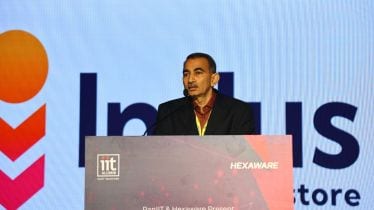By Pradeep Bhargava
The field of engineering education is in a constant state of evolution, adapting to the latest technological advancements and aligning with the dynamic needs of different businesses. We are living in the era of generative AI, where artificial intelligence (AI) and machine learning (ML) systems play pivotal roles in applications ranging from email filters to the operation of autonomous vehicles and robots. As businesses are advancing with AI-based innovations, it raises critical questions about the seamless integration of AI-based education systems into both macro and micro educational contexts. It becomes imperative to investigate the roles played by various stakeholders in the AI-based education ecosystem and to take business or consumer uses of AI technology platforms into account when developing new AI platforms.
Digital India: Utilizing Technology to Create a Connected Nation
India is leading the world in digital transformation due a dynamic mix of public and private initiatives. With over 1.2 billion Indians enrolled in the government’s Aadhaar programme, the largest biometric digital identity scheme in the world, a safe foundation for internet services has been established. Digital technology usage has accelerated since the Goods and Services Tax (GST) was implemented, bringing millions more businesses online. India is a global champion of Digital Public Infrastructure (DPI), as highlighted in G20 deliberations, wherein programmes such as Aadhaar and the Unified Payments Interface (UPI) were discussed. The way our country approaches DPI demonstrates its dedication to using technology to promote digital inclusion.
Due to the competitive offerings of telecom companies, internet access has dramatically increased among the population where lower income levels have had the highest internet consumption and subscriber rates. India continues to lead the world in digital payments, with over 100 billion real-time transactions processed in 2023. With the goal of creating a $1 trillion digital economy by 2025 and establishing India as a major hub for digital innovation and production worldwide, the nation seeks to promote digital ecosystems.
Twenty-first-century engineering is digital engineering.
Engineering has transitioned into digital engineering in the twenty-first century, blending traditional disciplines with data analysis, machine learning, artificial intelligence, and applied mathematics. By 2030, the global market for digital engineering is projected to be worth USD 1.3 trillion, expanding at a 16 percent compound annual growth rate (CAGR) between 2021 and 2030. The market is being driven by the growing demand from a variety of industries, such as manufacturing, automotive, aerospace, healthcare, and energy, for digital engineering services. With a $100 billion market share in ER&D global sourcing spending by 2025, India is well-positioned to lead in digital engineering services.
Industry sectors that are majorly impacted by this shift include automotive, health technology, and manufacturing. The digital talent gap is expected to increase from 25 percent to 28–29 percent in 2028, despite India’s favourable tech talent landscape. This will require businesses to embrace new techniques for acquiring new talent. Industry 5.0 driven digital engineering is quickly taking over as the norm, demanding a reconsideration of conventional approaches using cutting-edge technologies like digital twins, robotics, AR/VR, cloud, data, and AI for increased productivity, growth, and sustainability. Businesses are consistently striving to establish a robust digital foundation to engage effectively with customers and other stakeholders in the value chain.
Building and scaling out of India’s AI and ML capabilities
The development and expansion of India’s capabilities in Artificial Intelligence (AI) and Machine Learning (ML) rely on robust collaborations between industry and academia. Strengthening partnerships is crucial to align engineering education with the evolving needs of the AI and ML sector, providing students with practical exposure to real-world projects and relevant skills. Leading the charge, the Indian Institutes of Technology (IITs) have been involved in cutting-edge research across AI and ML domains, such as computer vision, natural language processing, and robotics. Collaborating actively with industry partners, these institutions contribute to the creation of innovative AI and ML applications across sectors like manufacturing, healthcare, and agriculture.
The integration of AI and ML into engineering education signals a paradigm shift, prompting engineering institutions to revamp curricula for the digital era. Embracing digital engineering becomes key for India, fostering innovation, entrepreneurship, and sustainable economic growth in this new technological landscape.
IIT: Paving the Way for India’s Next Economic Surge and Job Boom
In conclusion, the impending AI revolution presents India with a golden opportunity to not only maintain its position as a global IT hub but also to lead the world in the development and application of AI technologies. By embracing AI and upskilling its workforce, India can harness the power of AI to create a more inclusive, prosperous, and sustainable future for its netizens. The proactive initiatives undertaken by IITs, such as offering new AI certifications and hosting global events like PIWOT, demonstrate India’s commitment to seizing this opportunity and shaping the future of AI.
The author is CEO, GladMinds Solutions
